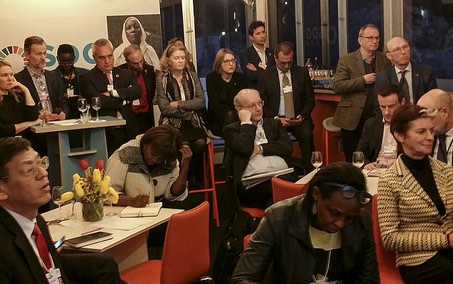To accelerate progress to end hunger and malnutrition, we must work together with all key stakeholders—especially the private sector. This was one of the takeaways from the 2018 IFPRI-FAO Bangkok Conference, and was also the focus of the recent IFPRI co-organized side event in Davos during the 2019 World Economic Forum Annual Meeting. IFPRI, along with the Global Alliance for Improved Nutrition (GAIN), the Global Nutrition Report, Scaling Up Nutrition (SUN), Wageningen University & Research (WUR), and the World Business Council for Sustainable Development (WBCSD), hosted the event, Accelerating the End of Hunger and Malnutrition: Data, Investment, Partnership, and Accountability.
Many high-level global leaders from various sectors discussed how to best speed up progress toward ending hunger and malnutrition. Discussions showed that food security and nutrition are high on the agenda of the private sector, but it is critical to move from talk to action. Collaboration with the private sector is critical especially to shape and diversify diets for nutrition, health, and sustainability.
Speakers included Abigail Perry, Senior Nutrition Advisor at the UK Department for International Development (DFID), GAIN Executive Director Lawrence Haddad, WBCSD Managing Director for Food, Land, and Water Programs Diane Holdorf, WUR Policy Advisor Ruerd Ruben, SUN Movement Coordinator Gerda Verburg, and IFPRI Board Chair Mari Pangestu.
Pangestu, who served as Minister of Trade in Indonesia, noted current efforts to use trade as a means to improve the country’s food security—and the key role of data and evidence-based research to help convince the government to take this positive step.
Indeed, there was consensus that evidence will be at the core of efforts to formulate and inform solutions to issues facing the food system today. In particular, the focus should be on what works. Collecting timely data will be critical to build evidence from success stories, measure the impact of food systems, and provide accountability. Innovations, such as new and alternative commodities, can also contribute to diet diversification. Proven approaches to influencing consumer demand toward healthier foods will need to be better understood.
To accelerate progress, more investments are needed. All levels of government, especially local government, are important to implement solutions for nutrition. By creating an enabling environment for improved nutrition, governments and companies can work together to address challenges and accelerate progress toward ending hunger and malnutrition.
Shenggen Fan is Director General of IFPRI.







